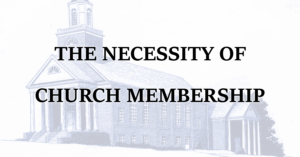
“Neither let the son of the stranger, that hath joined himself to the Lord, speak, saying, The Lord hath utterly separated me from his people…” (Isaiah 56:3).
Wilhelmus à Brakel The Christian’s Reasonable Service vol. 2, pp. 55-60.
It is the duty of everyone who desires to be saved to turn to the church, making diligent effort to be accepted as a member of the church community.
First, this is God’s way whereby He leads the elect unto salvation. “And the Lord added to the church daily such as should be saved” (Acts 2:47); “Neither let the son of the stranger, that hath joined himself to the Lord, speak, saying, The Lord hath utterly separated me from His people” (Isa 56:3).
Secondly, this has been the task of the apostles in accordance with their commission (Matt 28:19), as is to be observed in the entire Acts of the Apostles.
Thirdly, this is consistent with the nature of God’s children. As soon as they are converted, they cannot rest until they have been received into the bosom of their spiritual mother (Gal 4:26).
Fourthly, this is the consistent confession of the church of all ages, and particularly of churches of the Netherlands. In article 28 of the Belgic Confession we read: “We believe, since this holy congregation is an assembly of those who are saved, and that out of it there is no salvation, that no person of whatsoever state or condition he may be, ought to withdraw himself, to live in a separate state from it; but that all men are in duty bound to join and unite themselves with it.” We have elaborated on this in chapter 24.
Fifthly, the church is the glory of Christ. It is there that Christ is confessed and proclaimed throughout the world, being held forth as a banner upon a hill around which one must gather himself. This is the city upon a hill, and a light shining in the darkness. She is the means whereby the truth is made known and preserved, and the means unto the conversion of souls. Everyone is therefore obligated to facilitate this by joining himself to the church.
Motives for Joining the Church
In order that you may be stirred up and be active concerning this, calmly consider first of all that there are but two kings in this world, each having a kingdom: the kingdoms of Christ and of the devil, which are mortal enemies to each other. A third kingdom does not exist. Every person upon earth is either a subject of King Jesus or of the devil, the prince of darkness. No matter who you are individually, you are truly a subject of one of these two kingdoms. You are neither neutral nor a subject of both kingdoms simultaneously. Therefore, to which kingdom do you presently belong? What do you have to say for yourself? If you neither know nor have ever given this any thought, come and sit next to me for a moment; let us consider this matter, and then make a heartfelt and eternal choice. Whose subject do you wish to be? Whom do you choose to be your king?
If you choose the devil to be your king and to be subject to him—to do his will, to indulge in your lusts, to wallow in your sins as a swine in the mire, to seek those things which are upon earth, to satisfy your lusts, as well as for leisure and entertainment—o let it be. Enjoy it to the fullest as long as you have the opportunity. “Rejoice, O young man, in thy youth; and let thy heart cheer thee in the days of thy youth, and walk in the ways of thine heart, and in the sight of thine eyes” (Eccles. 11:9); “…love the world…all that is in the world, the lust of the flesh, and the lust of the eyes, and the pride of life…” (1 John 2:15-16). If therefore by your very deeds you reveal yourself to be a subject of the devil, be also not ashamed to bear the name of such a subject. Own, acknowledge, and confess the devil to be your lord and master. Trust in him, and delight yourself in the fact that you will eternally be with him in the lake that burns with brimstone, where the smoke of torment will ascend forever and ever.
Someone may think, “This is stated too blatantly. Christ must be our King. Even if we seek our own pleasure, conform to the will of Satan, and live a distinctly worldly life, the devil is not therefore our king.” To this we respond, “He most certainly is!” If you in turn respond, “Christ is nevertheless our King,” we reply, “He most certainly is not!” Listen to what Paul says: “Know ye not, that to whom ye yield yourselves servants to obey, his servants ye are to whom ye obey; whether of sin unto death, or of obedience unto righteousness” (Rom 6:16).
Therefore, if in truth you neither wish the devil to be your king nor to have your portion with him in outer darkness, where there will be weeping and gnashing of teeth (Matt 25:30), then resolutely, without reservation, and without recantation resign from his service, and with all your heart bid the devil’s kingdom farewell, forsake all sin and the lusts of the flesh, and enter into the kingdom of the Lord Jesus. Receive Him as your sole and sovereign King. Do this not only verbally, externally, by way of approximation or by way of sudden impulse, but consciously and in truth. Continue reading →


